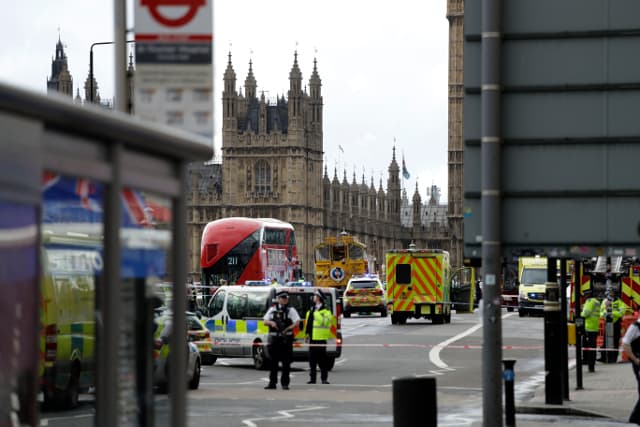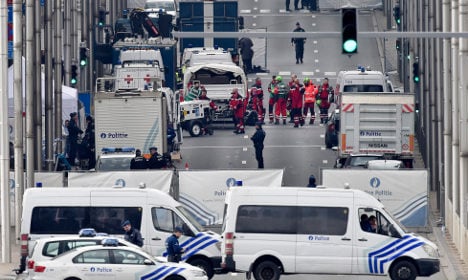What should you do during a terror attack?

The likelihood of ending up in the middle of a terror attack remains low in Sweden. But if the worst should happen, what can you do to boost your chances? The Local asked experts for advice.
This article was written in 2015 and updated in 2017.
1. Keep cool and stay out of more trouble
Don't panic. Assess the situation and try to locate a safe spot.
"Stay calm (…) and make sure you don't end up in more trouble than you're already in, physically speaking," advises Lars Förstell, an experienced police officer based in southern Sweden.
But that is easier said than done.
Yvonne Norrgård of the Swedish Civil Defence Association (Civilförsvarsförbundet) – a volunteer organization which assists authorities in crisis situations – argues that none of us really know how we would react to a catastrophe.
"Some freeze, others panic and run (…) Those who made it in France were the ones who played dead. It is horrible to say it, but they were the ones who survived," she says.
However, while there were also several reports after the massacre on Utöya island in Norway of survivors playing dead, some security experts advise against it. "Run and find cover," writes the UK's counter-terrorism security office.
2. Be observant and raise the alarm
Vigilance is not just key for preventing terror crimes. Even during or after an attack, it is important to be observant and make note of any details that stand out in your surroundings, which could help police and rescue teams arriving on the scene.
"Call 112 [the European emergency number] and explain what you're doing, what you're seeing, explain the situation and follow the directions they give you," says Förstell.
3. Don't put yourself in harm's way
A train attack in France in August 2015 was foiled after four passengers overpowered the gunman. But three of the men were trained US soldiers who were physically fit and knew what they were doing. In general, most experts advise members of the public not to engage with attackers.
"Intervening against an armed individual is both dangerous and not always successful, if you don't know that you are trained for it. But the terrorist may also have military training and be armed, and faced with that you don't stand much of a chance," says Förstell.

The March 22nd 2016 terror attacks in Brussels. Photo: AP Photo/Martin Meissner
4. Let the professionals do their job
Police, fire and rescue services, and paramedics know what to do. Let them get on with it, advises Norrgård.
"If your have the skills needed, you can ask if there is anything you can do to help, but otherwise you should let them work. They have the experience and the competence," she says.
Also, think ahead. Don't get in the way of the police investigation that is sure to follow the attack, and which could help prevent future fatal incidents.
Förstell explains: "Say there's been an explosion and you see an unattended bag. Don't mess things up and don't try to touch or move the bag."
5. Help each other and work together
Cooperating with the people around you could boost your chances of survival and speed up evacuation, according to psychological studies and research into previous terror attacks, such as the bombings on the London underground on July 7th 2005 or the 9/11 attacks on the US Twin Towers in 2001.
You can also help each other to stay alive if you have been injured, by huddling up together to keep warm, or covering each other's wounds.
"A terror attack is a crisis situation. If you look at historic catastrophes those who survive are the ones who manage to keep their bodies warm and their heads cool," says Norrgård.
"If you seen anyone who is injured, try to be there for them and be compassionate," adds Förstell.
6. Stay up-to-date with developments
Several key authorities, including the Civil Contingencies Agency (MSB) and the Security Services (Säpo), told The Local they were not able to offer any advice when this article was first written in 2015, with each referring back to the other. After the attack in Nice, France, in 2016, the Swedish police updated their website here (in Swedish). Their general advice is to find a safe spot, be vigilant, be quiet, raise the alarm and keep up-to-date by following news media.
Staying tuned to social media and live news feeds to make sure you know what is going on is key. For more information on the general state of security, check Säpo's website (in English) and for more tips (in Swedish) on how to act in a crisis situation, consult Civilförsvaret which also organizes classes for the general public.
Comments
See Also
This article was written in 2015 and updated in 2017.
1. Keep cool and stay out of more trouble
Don't panic. Assess the situation and try to locate a safe spot.
"Stay calm (…) and make sure you don't end up in more trouble than you're already in, physically speaking," advises Lars Förstell, an experienced police officer based in southern Sweden.
But that is easier said than done.
Yvonne Norrgård of the Swedish Civil Defence Association (Civilförsvarsförbundet) – a volunteer organization which assists authorities in crisis situations – argues that none of us really know how we would react to a catastrophe.
"Some freeze, others panic and run (…) Those who made it in France were the ones who played dead. It is horrible to say it, but they were the ones who survived," she says.
However, while there were also several reports after the massacre on Utöya island in Norway of survivors playing dead, some security experts advise against it. "Run and find cover," writes the UK's counter-terrorism security office.
2. Be observant and raise the alarm
Vigilance is not just key for preventing terror crimes. Even during or after an attack, it is important to be observant and make note of any details that stand out in your surroundings, which could help police and rescue teams arriving on the scene.
"Call 112 [the European emergency number] and explain what you're doing, what you're seeing, explain the situation and follow the directions they give you," says Förstell.
3. Don't put yourself in harm's way
A train attack in France in August 2015 was foiled after four passengers overpowered the gunman. But three of the men were trained US soldiers who were physically fit and knew what they were doing. In general, most experts advise members of the public not to engage with attackers.
"Intervening against an armed individual is both dangerous and not always successful, if you don't know that you are trained for it. But the terrorist may also have military training and be armed, and faced with that you don't stand much of a chance," says Förstell.

The March 22nd 2016 terror attacks in Brussels. Photo: AP Photo/Martin Meissner
4. Let the professionals do their job
Police, fire and rescue services, and paramedics know what to do. Let them get on with it, advises Norrgård.
"If your have the skills needed, you can ask if there is anything you can do to help, but otherwise you should let them work. They have the experience and the competence," she says.
Also, think ahead. Don't get in the way of the police investigation that is sure to follow the attack, and which could help prevent future fatal incidents.
Förstell explains: "Say there's been an explosion and you see an unattended bag. Don't mess things up and don't try to touch or move the bag."
5. Help each other and work together
Cooperating with the people around you could boost your chances of survival and speed up evacuation, according to psychological studies and research into previous terror attacks, such as the bombings on the London underground on July 7th 2005 or the 9/11 attacks on the US Twin Towers in 2001.
You can also help each other to stay alive if you have been injured, by huddling up together to keep warm, or covering each other's wounds.
"A terror attack is a crisis situation. If you look at historic catastrophes those who survive are the ones who manage to keep their bodies warm and their heads cool," says Norrgård.
"If you seen anyone who is injured, try to be there for them and be compassionate," adds Förstell.
6. Stay up-to-date with developments
Several key authorities, including the Civil Contingencies Agency (MSB) and the Security Services (Säpo), told The Local they were not able to offer any advice when this article was first written in 2015, with each referring back to the other. After the attack in Nice, France, in 2016, the Swedish police updated their website here (in Swedish). Their general advice is to find a safe spot, be vigilant, be quiet, raise the alarm and keep up-to-date by following news media.
Staying tuned to social media and live news feeds to make sure you know what is going on is key. For more information on the general state of security, check Säpo's website (in English) and for more tips (in Swedish) on how to act in a crisis situation, consult Civilförsvaret which also organizes classes for the general public.
Join the conversation in our comments section below. Share your own views and experience and if you have a question or suggestion for our journalists then email us at [email protected].
Please keep comments civil, constructive and on topic – and make sure to read our terms of use before getting involved.
Please log in here to leave a comment.